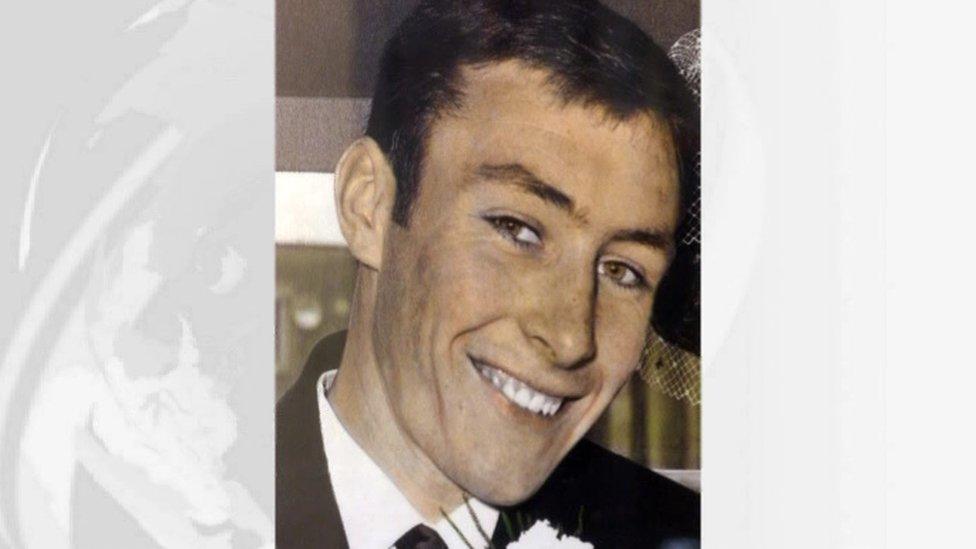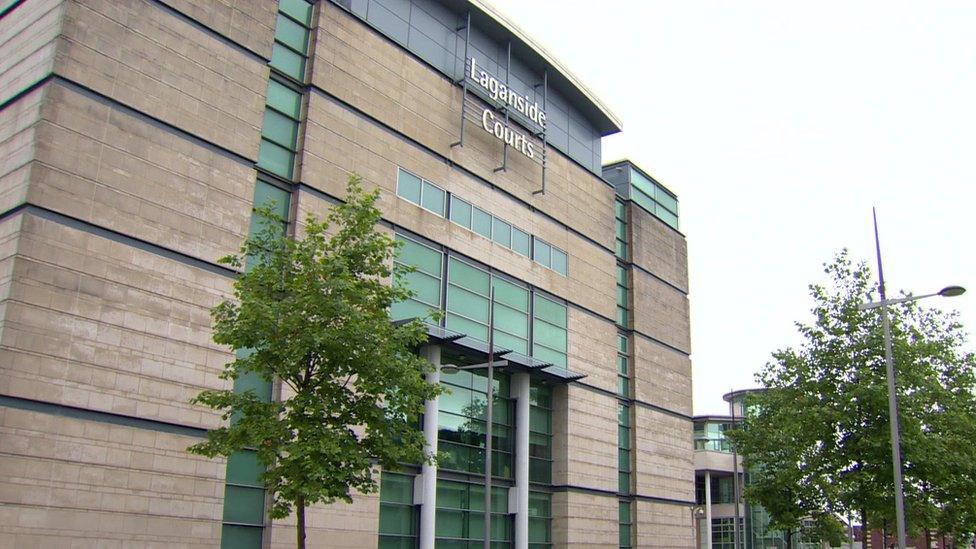Joe McCann: Ex-paratroopers deny murdering Official IRA man
- Published

Joe McCann was shot near his home in the Markets area of Belfast in April 1972
Two former paratroopers have denied murdering Official IRA man Joe McCann almost 50 years ago, a court has heard.
The 24-year-old was shot in disputed circumstances at Joy Street in the Markets, Belfast, on 15 April 1972.
Soldiers A and C - both in their 70s - entered not guilty pleas at Belfast Crown Court on Monday.
Later, the court heard that as Joe McCann lay dying, he told one soldier: "You have got me cold, I have no weapon."
Soldiers A and C both deny murdering Mr McCann but admit opening fire on him as he ran along Joy Street. They claim they acted within the Army's rules of engagement.

Joe McCann's family arrive at court with their solicitor Niall Murphy
But a Crown barrister argued the shooting "was not legally justified".
Mr McCann's widow, Anne, and family listened from the court's public gallery. The soldiers have been granted anonymity but were seen by those in the court.
As the case against them opened, Soldier A's barrister said that at time of his death, Mr McCann was suspected of being a senior figure in the Official IRA.
The barrister said that in April 1972, based on "high-grade intelligence", it was believed he had been involved in several murders.
In an agreed set of facts, the hearing was told that Mr McCann joined the IRA in 1965 when he was 17, that he was a member of the Army Council and that he lured security services to the Markets to be ambushed.
The agreed facts state he was viewed by the security services as an uncompromising member of the IRA. After his death, the Official IRA claimed he was responsible for the deaths of 15 British soldiers.
Struck three times
Opening the Crown case before the judge, a barrister said that on the day of the shooting members of C Company of the Parachute Regiment were on patrol when an RUC Special Branch officer told them that Mr McCann was near by.
The officer wanted to arrest him and asked for help.
It is the Crown's case that when Mr McCann resisted arrest and ran along Joy Street, three soldiers opened fire.
Soldiers A and C are now on trial. Soldier B has since died.
Mr McCann was struck three times as he fled. He was hit in the shoulder and wrist and a third bullet went through his left thigh causing catastrophic internal injuries.
The prosecution case is that the shooting was unlawful and was not justified to effect an arrest, nor was it necessary in self-defence. A Crown barrister said the prosecution would argue that the level of force used was unreasonable.
Soldiers A and C made statements in 1972 and were interviewed again in 2010 by the Historical Enquiries Team.
At that stage, Soldier A said he had little memory of it but did remember Mr McCann lying on the ground and a woman screaming.
'It's okay, you got me'
In his 1972 statement, he recalled an altercation between the RUC man and Mr McCann.
Afterwards, he said he saw Mr McCann run away "ducking and dodging" and he shouted at him to halt.
Shots were fired and Mr McCann fell, he said. He remembered approaching him.
"He (Mr McCann) was not in possession of any weapon. He said: 'You have got me cold, I have no weapon'," the statement added.
Soldier C was interviewed by the HET in 2010. He remembered being asked to assist in the arrest and Mr McCann running away.
"He was zig-zagging to avoid being shot," he said.
He fired one round and remembered Mr McCann saying: "It's okay, you got me."

The trial is being heard at the Crown Court, Laganside, Belfast
Later, when questioned by the HET, Soldier C said he believed he would not have exceeded the rules of engagement and felt "severely prejudiced" by the HET investigation.
A man who was 10 at the time of the shooting told the court he had been playing nearby.
He saw a body on the street and "blood running down the pavement into the gutter".
Another witness said he saw a line of five or six soldiers kneeling at the top of Joy Street.
He saw "a bit of a scuffle" between two men, saw a man run away and a heard a volley of shots, then saw the man lying on the ground.
Asked if he heard the soldiers shout anything at the man, the witness said he did not.
The trial continues.